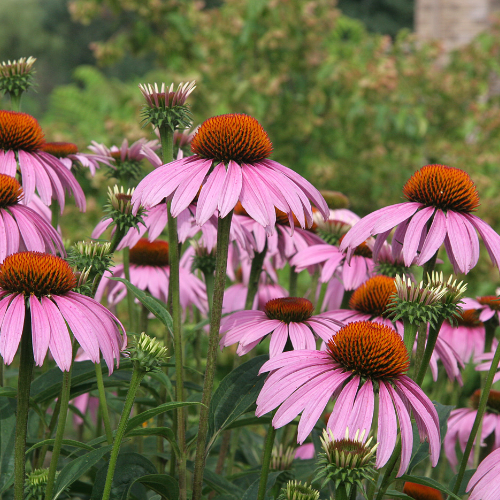Purple Coneflower Seeds
Purple Coneflower Seeds
- NON-GMO
- Container Friendly
Couldn't load pickup availability

Growing Purple Coneflower Seeds
-
Germination Rate
10 to 21 days
-
Sun
Full Sun (6+ hours per day)
-
Plant Type
-
Plant Size
12 to 24 inches
-
Water Needs
Keep soil evenly moist
-
Seed Depth
1/4 inch light cover
-
Container Size
Extra Large Pot (24–36 inch)
-
Expect To Harvest
Over 90 days
-
Zones
3–9
-
Plant Spacing
12–18 inches
-
Companion Plants
Lavender, oregano and bee balm, thyme and peppers
-
Common Problems
-
Pest
Aphids, whiteflies and Japanese beetles
-
Culinary Uses
Purple Coneflower, or Echinacea purpurea, is a versatile herb with culinary and medicinal uses. Its vibrant flowers can be used to make teas, syrups, and tinctures, known for their immune-boosting properties. The leaves can also be added to salads, soups, and stews for flavor.
-
Growing Season
Mid to Late Summer
-
Start Planting Indoors
6 to 10 weeks before the last frost
-
Start Planting Outdoors
2 to 4 weeks before the last frost, but starting inside is highly recommended or planting late fall
Growing Instructions
Starting your seeds
You can start Purple Coneflower seeds indoors using a heat mat to encourage germination. Once the seedlings sprout and grow a few sets of leaves, move them outdoors. Keep the soil moist and provide 4-6 hours of sunlight daily. When direct sowing Purple Coneflower seeds, plant them about 1/4 inch deep with a light cover of soil in well-drained soil. Space them 12–18 inches apart to give them plenty of room to grow and bloom beautifully.
Harvesting your seeds
When harvesting Purple Coneflower, wait until the flowers are fully open and the petals are vibrant and colorful. Use clean, sharp scissors or pruning shears to cut the flowers from the stem, leaving a portion of the stem attached for handling. Harvest flowers regularly to encourage continuous blooming.
Grow your own Immune Boosting Kit
Share







